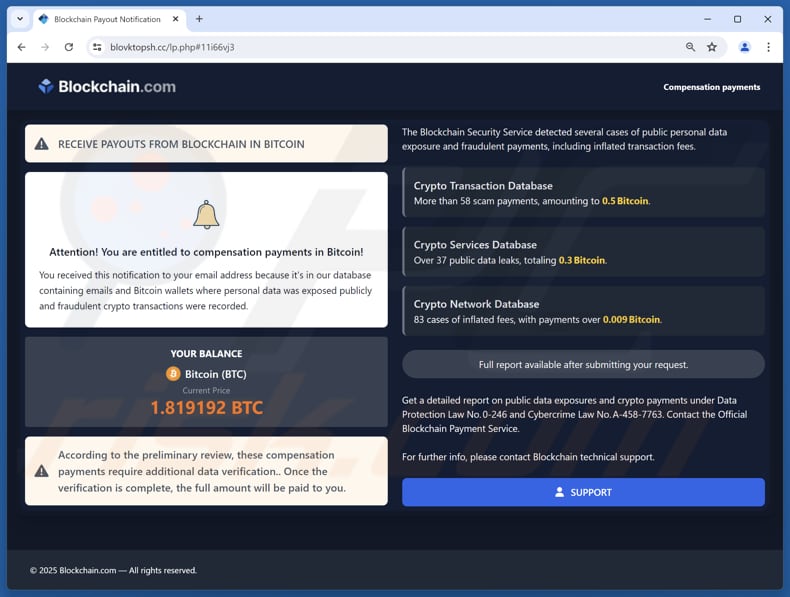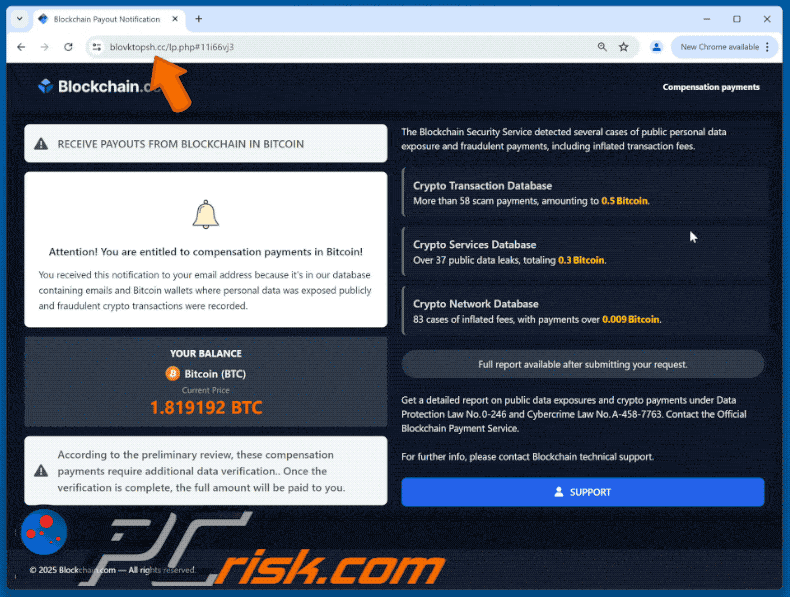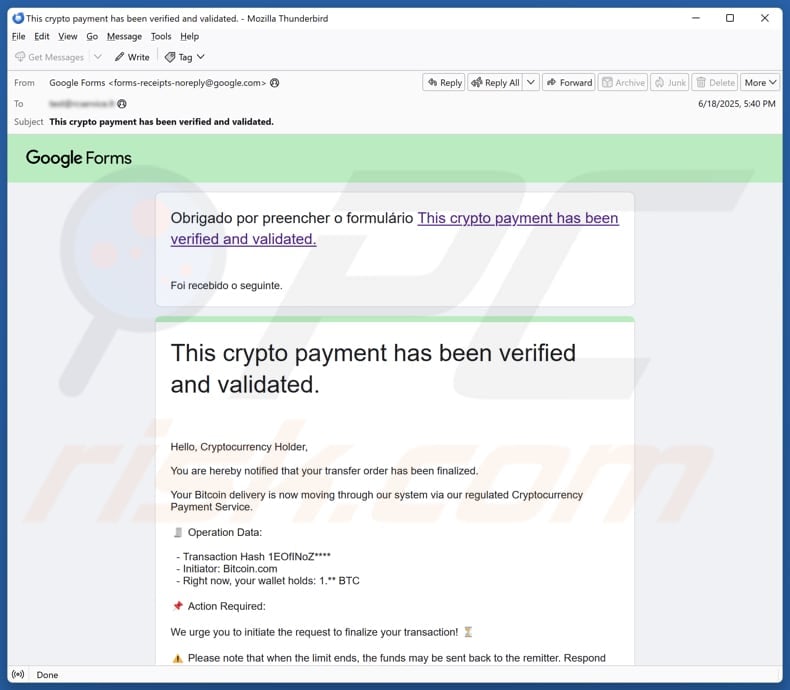How to avoid scams like "Blockchain.com Compensation Payments"
Phishing/ScamAlso Known As: Fake Blockchain.com Compensation Payments platform
Get free scan and check if your device is infected.
Remove it nowTo use full-featured product, you have to purchase a license for Combo Cleaner. Seven days free trial available. Combo Cleaner is owned and operated by RCS LT, the parent company of PCRisk.com.
What is the "Blockchain.com Compensation Payments" scam?
We discovered this scam upon receiving a fraudulent email. This scheme is designed to steal unsuspecting individuals' money (and some information). The scam website is disguised as a legitimate Blockchain (blockchain.com) platform to appear legitimate. Users should not trust the page (and the associated email).

"Blockchain.com Compensation Payments" in detail
The scam email promoting this scheme claims that a cryptocurrency transfer has been verified and is in progress. It informs the recipient that their Bitcoin is being delivered through a regulated service and urges them to take action to finalize the transaction. It also uses fake "operation data" to appear legitimate.
This email leads to a fake Google Doc document (which looks like the email) containing a link to a website (posing as blockchain.com). This site claims that users are entitled to payouts due to exposed personal data and fraudulent crypto activity. To receive the payment, users are told to verify their information and contact fake "Blockchain technical support".
The following steps in this scheme include contacting support and filling out the form (providing name, BTC address, and email address) to submit an application. Then, the site "checks" the application and provides a fake compensation amount in BTC. Ultimately, the site urges users to pay a fee to process their data and complete the Bitcoin transfer. The payment is depicted as a required step to receive the compensation.
However, there is no real compensation, and victims who pay this "fee" simply lose their money. The fraudsters have no intention of sending any compensation or providing any legitimate service. It is important to recognize such scams to avoid monetary loss and possibly other issues like identity theft.
| Name | Fake Blockchain.com Compensation Payments platform |
| Threat Type | Phishing, Scam, Social Engineering, Fraud |
| Fake Claim | Users can receive a compensation |
| Disguise | Legitimate blockchain.com website |
| Related Domains | blovktopsh[.]cc, trust-bitcloud[.]cc |
| Detection Names (blovktopsh[.]cc) | CRDF (Malicious), CyRadar (Malicious), Forcepoint ThreatSeeker (Malicious), Sophos (Malware), Trustwave (Phishing), Full List Of Detections (VirusTotal) |
| Detection Names (trust-bitcloud[.]cc) | alphaMountain.ai (Suspicious), Forcepoint ThreatSeeker (Malicious), Trustwave (Phishing), Full List Of Detections (VirusTotal) |
| Symptoms | Unofficial domain, lack of official verification, unrealistic claims, too good-to-be-true promises. |
| Distribution methods | Deceptive emails, fake websites, rogue online pop-up ads, unwanted applications. |
| Damage | Loss of sensitive private information, monetary loss. |
| Malware Removal (Windows) |
To eliminate possible malware infections, scan your computer with legitimate antivirus software. Our security researchers recommend using Combo Cleaner. Download Combo CleanerTo use full-featured product, you have to purchase a license for Combo Cleaner. 7 days free trial available. Combo Cleaner is owned and operated by RCS LT, the parent company of PCRisk.com. |
Conclusion
In conclusion, this scam relies on fake emails and websites to trick users into believing they are owed Bitcoin (or other cryptocurrency) compensation. It lures victims into providing personal information and paying a fake processing fee. Recognizing these tactics is key to avoiding financial loss and protecting personal data.
More examples of crypto-related scams are "Toncoin (TON) Bonus Rewards", "Claim $PAWS", and "$HILO Rewards".
How did I open a scam website?
Scams like the one we reviewed in our article are promoted through deceptive emails (a screenshot of the email promoting the examined scam can be found below). Also, users can be lured through links received from fake or stolen social media accounts or misleading advertisements, pop-ups, buttons, and links on shady (or compromised) websites.
Scam websites can also be accessed through push notifications from untrustworthy sites or ads delivered by adware. Users may also encounter scam sites when visiting sites that rely on rogue advertising networks, such as torrent or adult platforms.
How to avoid visiting scam pages?
Be cautious with unexpected emails or messages from unfamiliar senders, and avoid clicking on any links or attachments they contain. Always use trusted sources like official websites or app stores when downloading apps or files. Avoid interacting with ads, pop-ups, or other elements on questionable websites, and block any attempts from these sites to send notifications.
It is also important to regularly update your operating system and applications and scan your computer for threats with trusted antivirus software. If your computer is already infected with unwanted apps, we recommend running a scan with Combo Cleaner Antivirus for Windows to automatically eliminate them.
The appearance of "Blockchain.com Compensation Payments" scam (GIF):

Text in the main site (first screenshot):
Blockchain.com
Compensation payments
RECEIVE PAYOUTS FROM BLOCKCHAIN IN BITCOIN
Notification
Attention! You are entitled to compensation payments in Bitcoin!
You received this notification to your email address because it's in our database containing emails and Bitcoin wallets where personal data was exposed publicly and fraudulent crypto transactions were recorded.YOUR BALANCE
BTC IconBitcoin (BTC)Current Price
1.819192 BTC
According to the preliminary review, these compensation payments require additional data verification.. Once the verification is complete, the full amount will be paid to you.
The Blockchain Security Service detected several cases of public personal data exposure and fraudulent payments, including inflated transaction fees.Crypto Transaction Database
More than 58 scam payments, amounting to 0.5 Bitcoin.
Crypto Services Database
Over 37 public data leaks, totaling 0.3 Bitcoin.
Crypto Network Database
83 cases of inflated fees, with payments over 0.009 Bitcoin.
Full report available after submitting your request.
Get a detailed report on public data exposures and crypto payments under Data Protection Law No. 0‑246 and Cybercrime Law No. A‑458‑7763. Contact the Official Blockchain Payment Service.
For further info, please contact Blockchain technical support.
SUPPORT
© 2025 Blockchain.com — All rights reserved.
Screenshot of the fake "payout notification" page:

Screenshot of the email promoting the scam:

Text in this email:
This crypto payment has been verified and validated.
Hello, Cryptocurrency Holder,
You are hereby notified that your transfer order has been finalized.
Your Bitcoin delivery is now moving through our system via our regulated Cryptocurrency Payment Service.
Operation Data:
- Transaction Hash 1EOfINoZ****
- Initiator: Bitcoin.com
- Right now, your wallet holds: 1.** BTCAction Required:
We urge you to initiate the request to finalize your transaction!
Please note that when the limit ends, the funds may be sent back to the remitter. Respond quickly to make sure you receive your Bitcoins!
Require Assistance?
Our dedicated customer service is online 24/7 and ready to help with any questions you may have. Your experience is our focus!
With respect,
Your Representative – David Wells
Crypto DepartmentTo get more information, please click below
Bitcoin Info (CLICK) Check details
Instant automatic malware removal:
Manual threat removal might be a lengthy and complicated process that requires advanced IT skills. Combo Cleaner is a professional automatic malware removal tool that is recommended to get rid of malware. Download it by clicking the button below:
DOWNLOAD Combo CleanerBy downloading any software listed on this website you agree to our Privacy Policy and Terms of Use. To use full-featured product, you have to purchase a license for Combo Cleaner. 7 days free trial available. Combo Cleaner is owned and operated by RCS LT, the parent company of PCRisk.com.
Quick menu:
- What is Fake Blockchain.com Compensation Payments platform?
- How to identify a pop-up scam?
- How do pop-up scams work?
- How to remove fake pop-ups?
- How to prevent fake pop-ups?
- What to do if you fell for a pop-up scam?
How to identify a pop-up scam?
Pop-up windows with various fake messages are a common type of lures cybercriminals use. They collect sensitive personal data, trick Internet users into calling fake tech support numbers, subscribe to useless online services, invest in shady cryptocurrency schemes, etc.
While in the majority of cases these pop-ups don't infect users' devices with malware, they can cause direct monetary loss or could result in identity theft.
Cybercriminals strive to create their rogue pop-up windows to look trustworthy, however, scams typically have the following characteristics:
- Spelling mistakes and non-professional images - Closely inspect the information displayed in a pop-up. Spelling mistakes and unprofessional images could be a sign of a scam.
- Sense of urgency - Countdown timer with a couple of minutes on it, asking you to enter your personal information or subscribe to some online service.
- Statements that you won something - If you haven't participated in a lottery, online competition, etc., and you see a pop-up window stating that you won.
- Computer or mobile device scan - A pop-up window that scans your device and informs of detected issues - is undoubtedly a scam; webpages cannot perform such actions.
- Exclusivity - Pop-up windows stating that only you are given secret access to a financial scheme that can quickly make you rich.
Example of a pop-up scam:

How do pop-up scams work?
Cybercriminals and deceptive marketers usually use various advertising networks, search engine poisoning techniques, and shady websites to generate traffic to their pop-ups. Users land on their online lures after clicking on fake download buttons, using a torrent website, or simply clicking on an Internet search engine result.
Based on users' location and device information, they are presented with a scam pop-up. Lures presented in such pop-ups range from get-rich-quick schemes to fake virus scans.
How to remove fake pop-ups?
In most cases, pop-up scams do not infect users' devices with malware. If you encountered a scam pop-up, simply closing it should be enough. In some cases scam, pop-ups may be hard to close; in such cases - close your Internet browser and restart it.
In extremely rare cases, you might need to reset your Internet browser. For this, use our instructions explaining how to reset Internet browser settings.
How to prevent fake pop-ups?
To prevent seeing pop-up scams, you should visit only reputable websites. Torrent, Crack, free online movie streaming, YouTube video download, and other websites of similar reputation commonly redirect Internet users to pop-up scams.
To minimize the risk of encountering pop-up scams, you should keep your Internet browsers up-to-date and use reputable anti-malware application. For this purpose, we recommend Combo Cleaner Antivirus for Windows.
What to do if you fell for a pop-up scam?
This depends on the type of scam that you fell for. Most commonly, pop-up scams try to trick users into sending money, giving away personal information, or giving access to one's device.
- If you sent money to scammers: You should contact your financial institution and explain that you were scammed. If informed promptly, there's a chance to get your money back.
- If you gave away your personal information: You should change your passwords and enable two-factor authentication in all online services that you use. Visit Federal Trade Commission to report identity theft and get personalized recovery steps.
- If you let scammers connect to your device: You should scan your computer with reputable anti-malware (we recommend Combo Cleaner Antivirus for Windows) - cyber criminals could have planted trojans, keyloggers, and other malware, don't use your computer until removing possible threats.
- Help other Internet users: report Internet scams to Federal Trade Commission.
Frequently Asked Questions (FAQ)
What is a crypto scam?
It is a type of fraud involving cryptocurrency (e.g., a fake crypto giveaway, investment opportunity, or crypto compensation program).
What is the purpose of a crypto scam?
The purpose of a crypto scam is to steal cryptocurrency or personal information from victims for financial gain.
Why do I encounter scam websites?
Scam websites are often promoted through deceptive emails, fake or hacked social media accounts, misleading ads, and pop-ups on shady or compromised sites. They can also be accessed via push notifications from untrusted sources, adware-generated ads, or by visiting sites that use rogue ad networks, like torrent or adult websites.
Will Combo Cleaner protect me from scams?
Combo Cleaner scans websites and identifies malicious ones, including those that deliver scams. When such a site is detected, it immediately warns you and blocks access.
Share:

Tomas Meskauskas
Expert security researcher, professional malware analyst
I am passionate about computer security and technology. I have an experience of over 10 years working in various companies related to computer technical issue solving and Internet security. I have been working as an author and editor for pcrisk.com since 2010. Follow me on Twitter and LinkedIn to stay informed about the latest online security threats.
PCrisk security portal is brought by a company RCS LT.
Joined forces of security researchers help educate computer users about the latest online security threats. More information about the company RCS LT.
Our malware removal guides are free. However, if you want to support us you can send us a donation.
DonatePCrisk security portal is brought by a company RCS LT.
Joined forces of security researchers help educate computer users about the latest online security threats. More information about the company RCS LT.
Our malware removal guides are free. However, if you want to support us you can send us a donation.
Donate
▼ Show Discussion